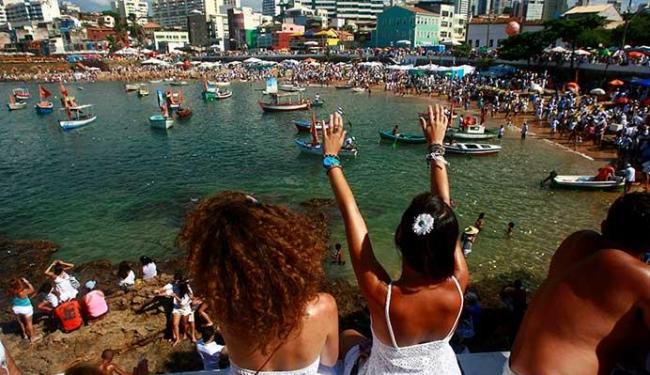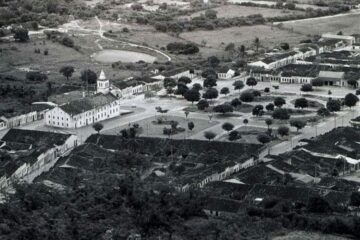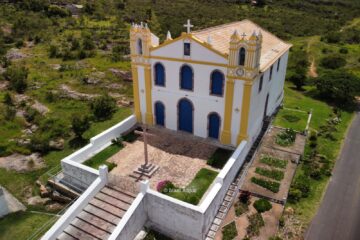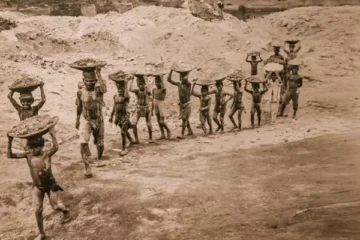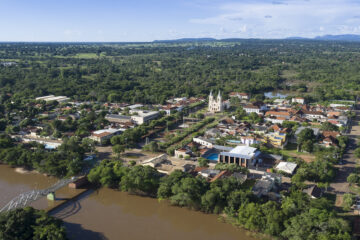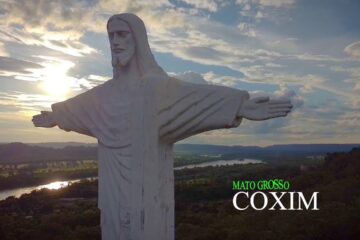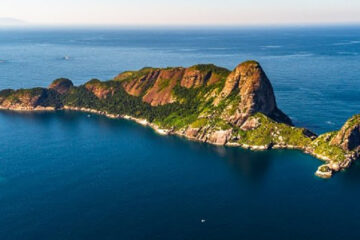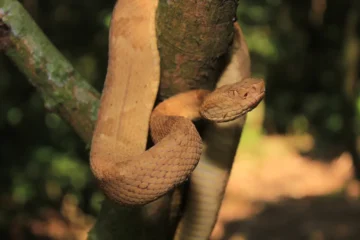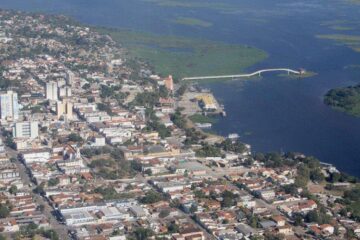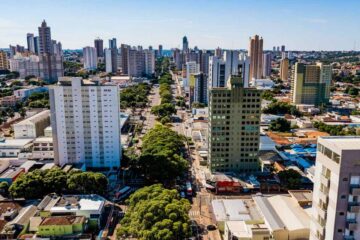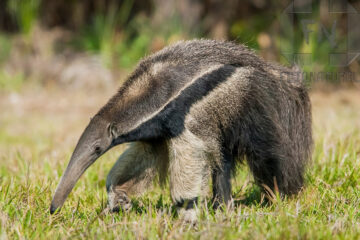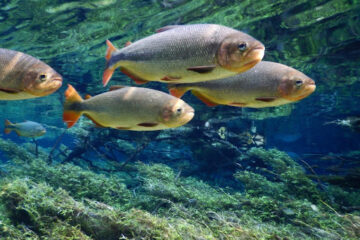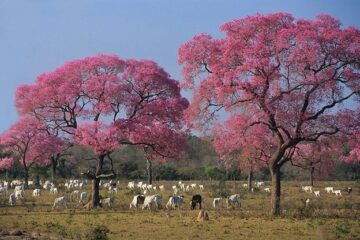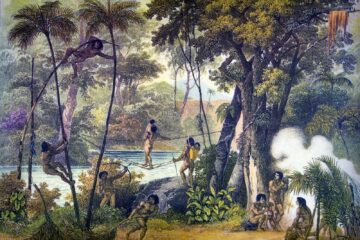Este post também está disponível em:
Português
English

The Iemanjá festival in Salvador da Bahia attracts thousands of Bahians and tourists who crowd the beaches of Rio Vermelho on 2 February every year.
Iyemanjá, Yemanjá, Yemaya, Iemoja “Iemanjá” or Yemoja, is an African orixá, whose name derives from the Yoruba expression “Yèyé omo ejá” (“Mother whose children are fish”), identified in the merindilogun game by the odu ejibe and ossá, represented materially and immaterially by the candomblé, through the sacred settlement called igba yemanja.
In Brazil, the orisha enjoys great popularity among followers of Afro-Brazilian religions, and even by members of different religions.
In Salvador a festa de Iemanjá, one of the country’s largest festivals in honour of Iemanjá “Queen of the Sea” takes place annually on 2 February.
The celebration involves thousands of people who, dressed in white, go out in procession to the main temple, located near the mouth of the Red River, where they deposit varieties of offerings, such as mirrors, jewellery, food, perfumes and all sorts of pleasures.
Another important festival dedicated to Iemanjá takes place during New Year’s Eve in Rio de Janeiro.
See also History of Afro-Brazilian religions in Bahia.
Thousands of people attend the feast of Iemanjá and deposit offerings for the deity in the sea.
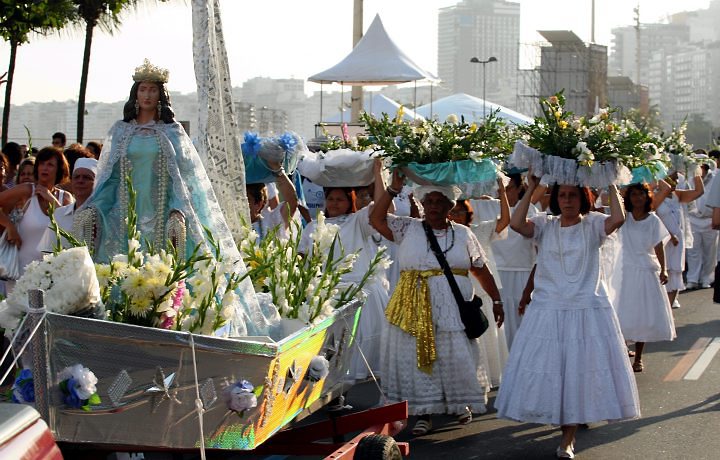
The celebration also includes the traditional “popcorn bath” and the seven waves that the faithful, or even followers of other religions, jump as a way of asking for luck to the Orixá.
In Umbanda, she is considered the deity of the sea, as well as being the patron goddess of shipwrecked people, mother of all human heads.
Iemanjá, queen of the sea, is also known as dona Janaína, Inaê, Princess of Aiocá and Maria, in parallelism with the Catholic religion.
Aiocá is the kingdom of the mysterious lands of happiness and freedom, image of the homelands of Africa, longing for the free days in the forest .
In addition to the great diversity of African names by which Iemanjá is known, the Portuguese form Janaína is also used, although on rare occasions.
The nickname, created during slavery, was the mildest form of “syncretism” found by blacks to perpetuate their traditional cults without the intervention of their masters, who considered such “pagan manifestations” unacceptable on their property.
Although this invocation has fallen into disuse, several compositions of popular authorship have been realised in order to salute “Janaína do Mar” and as liturgical songs.
For the first time, on 2 February 2010, a sculpture of a black mermaid, created by the artist Washington Santana, was chosen as the representation of Iemanjá in the great and traditional gift of the festival of Rio Vermelho, Salvador, Bahia in honour of Africa and the Afro-descendant religion.
There is a syncretism between the Catholic saint Nossa Senhora dos Navegantes and the orisha of African mythology Iemanjá.
At times, even festivals in honour of the two merge. In Brazil, both Nossa Senhora dos Navegantes and Iemanjá have their festive date on 2 February.
It is customary to celebrate the day dedicated to her with a large river procession. One of the biggest celebrations of Iemanjá occurs in Porto Alegre, Rio Grande do Sul, due to the syncretism with Nossa Senhora dos Navegantes.
In the same state, in Pelotas the image of Our Lady of the Navigators goes to the Port of Pelotas. Before the Catholic festival ends, one of the most striking moments of the feast of Our Lady of the Navigators in Pelotas takes place, which in 2008 reached its 77th edition.
The boats stop and are greeted by Umbandists carrying the image of Iemanjá, providing an ecumenical meeting watched from the waterfront by several people.
On 8 December, another festival is held on the Bahian seafront: the Feast of Our Lady of the Conception of the Beach.
This day, 8 December, is dedicated to the patron saint of Bahia, Nossa Senhora da Conceição da Praia, and is a municipal holiday in Salvador.
Also on this date is held, at Pedra Furada, on Monte Serrat in Salvador, the gift of Iemanjá, a popular manifestation that originates from the devotion of local fishermen to the Queen of the Sea – also known as Janaína.
In the capital of Paraíba, the city of João Pessoa, the municipal holiday dedicated to Nossa Senhora da Conceição, 8 December, is the day of the traditional festival in honour of Iemanjá.
Every year, a circular stage surrounded by flags and blue and white ribbons is set up on Tambaú Beach, around which faithful from various parts of the state and curious people gather to watch the parade of the orishas and, above all, the honoured one.
On the beach, there are holes with lit candles, flowers and gifts.
In 2008, according to the organisers of the festival, 100,000 people came to the site.
The Iemanjá Festival in Rio Vermelho
The traditional Festa de Iemanjá in the city of Salvador, capital of Bahia, takes place on the beach of Rio Vermelho every 2 February.
On the same date, Iemanjá is also worshipped on several other Brazilian beaches, where candles and flowers are offered to her, thrown into the sea in small handmade boats.
The Catholic festival takes place at the Church of Nossa Senhora da Conceição da Praia, in Cidade Baixa, while the Candomblé and Umbanda terreiros make divisions surrounded with ropes, ribbons and flowers on the beaches, delimiting space for the houses of saint that will carry out their work on the sand.
In Brazil, Iemanjá in Pierre Verger’s version, represents the mother who protects her children at any cost, the mother of several children, or several fish, who loves to take care of children and domestic animals.
Iemanjá Festival in Salvador de Bahia
